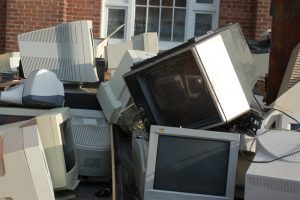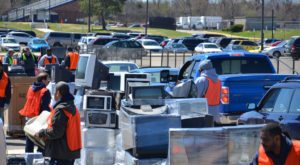 A Pennsylvania county gets its first collection center years after the state’s electronics landfill ban was enacted, and Washington state reports lower collection weights than a year ago.
A Pennsylvania county gets its first collection center years after the state’s electronics landfill ban was enacted, and Washington state reports lower collection weights than a year ago.

 A Pennsylvania county gets its first collection center years after the state’s electronics landfill ban was enacted, and Washington state reports lower collection weights than a year ago.
A Pennsylvania county gets its first collection center years after the state’s electronics landfill ban was enacted, and Washington state reports lower collection weights than a year ago.
 Updates to the R2 standard continue to be developed, and a large e-scrap processing facility is under construction in South Australia.
Updates to the R2 standard continue to be developed, and a large e-scrap processing facility is under construction in South Australia.
 A legislative fix to revamp Pennsylvania’s struggling electronics recycling program isn’t going to cut it, according to a group of five recycling stakeholders in the state.
A legislative fix to revamp Pennsylvania’s struggling electronics recycling program isn’t going to cut it, according to a group of five recycling stakeholders in the state.
 Regulators in California have decided to increase payments to companies participating in the state’s electronics recycling program.
Regulators in California have decided to increase payments to companies participating in the state’s electronics recycling program.
 A bill axing North Carolina’s electronics recycling law has hit a stumbling block.
A bill axing North Carolina’s electronics recycling law has hit a stumbling block.
 A lawsuit from TV manufacturer Vizio that questioned the constitutionality of Connecticut’s electronics recycling law and program has been dismissed in its entirety.
A lawsuit from TV manufacturer Vizio that questioned the constitutionality of Connecticut’s electronics recycling law and program has been dismissed in its entirety.
Minnesota is the latest state to consider updating its e-scrap recycling law.
 A bill that would reshape New Jersey’s e-scrap program was passed late last week by members of the state’s General Assembly. Continue Reading
A bill that would reshape New Jersey’s e-scrap program was passed late last week by members of the state’s General Assembly. Continue Reading
Absolute Document Destruction of Baton Rouge, La.; Ace Data Storage of Gulfport, Miss.; Computer Recycling Center of Springfield, Mo.; RDN of Hatillo, Puerto Rico; Rock Solid Shredding of Little Rock, Ark.; Secure Shred Solutions of Carroll, Iowa; Shredall of Nottingham, England; Shredlogix of San Jose, Calif.; Shred Right (a Rohn Industries Co.) of St. Paul, Minn.; TNT Shredding of Mesa, Ariz. and Tri-State Shredding of Harrisburg, Pa. have either achieved or renewed their NAID certifications for physical destruction of hard drives.
Visit our archive to view previous editions of the scorecard.
 The Middle East finds itself in the “starting phase” of e-scrap management, and Europe’s ambitious electronics collection goals may prove challenging to meet.
The Middle East finds itself in the “starting phase” of e-scrap management, and Europe’s ambitious electronics collection goals may prove challenging to meet.
